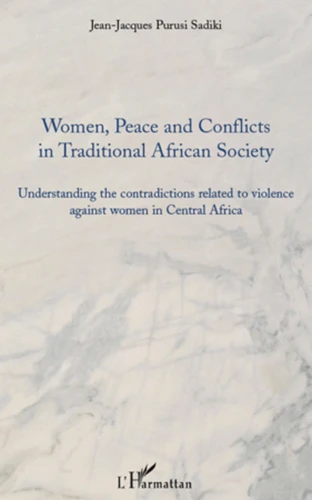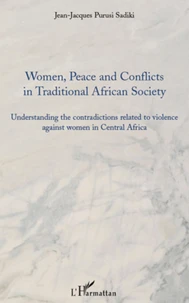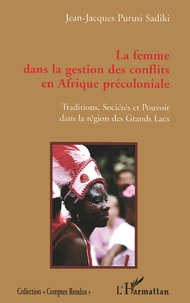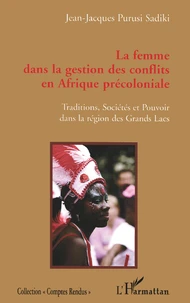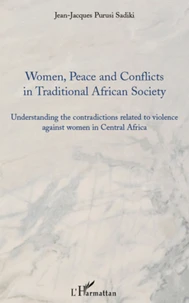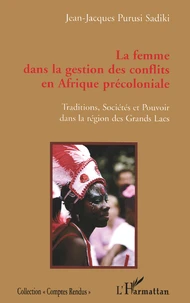Women, Peace and Conflicts in Traditional African Society. Understanding the contradictions related to violence against women in Central Africa
Par :Formats :
Disponible dans votre compte client Decitre ou Furet du Nord dès validation de votre commande. Le format PDF est :
- Compatible avec une lecture sur My Vivlio (smartphone, tablette, ordinateur)
- Compatible avec une lecture sur liseuses Vivlio
- Pour les liseuses autres que Vivlio, vous devez utiliser le logiciel Adobe Digital Edition. Non compatible avec la lecture sur les liseuses Kindle, Remarkable et Sony
 , qui est-ce ?
, qui est-ce ?Notre partenaire de plateforme de lecture numérique où vous retrouverez l'ensemble de vos ebooks gratuitement
Pour en savoir plus sur nos ebooks, consultez notre aide en ligne ici
- Nombre de pages170
- FormatPDF
- ISBN978-2-296-25385-8
- EAN9782296253858
- Date de parution01/06/2010
- Copier Coller01 page(s) autorisée(s)
- Protection num.Digital Watermarking
- Taille2 Mo
- ÉditeurL'Harmattan
Résumé
Africa remains the region in the world where conflicts and massive violations of human rights, and in particular violence against women, have remained the highest world-wide, since the Second World War. The continent is also subject to the highest number of local and international efforts aimed at struggling against these tragedies which destroy all activities for reconstruction and prevent progress towards Security Consul Resolutions 1325, 1612, etc.
and the Millennium Development Goals. Paradoxically and despite many actions in the field, each year more than 11 000 women become rape victims in the provinces of Kivu in eastern Democratic Republic of Congo, a region where an over abundance of natural resources have for generations been one of the triggers of persistent "economic conflicts" and where incredible suffering is inflicted on the local population abandoned to a sad fate.
In this regard women are a particular target of gender based violence. But despite difficulties of ail sorts, women remain upright and determined to survive and change their situation and that of their communities. This book, one of the first of this type of analysis written on this topic, analyses the strength and the importance of women in the corridors of power and their role in mechanisms for conflict resolution, prevention and transformation in the past, particularly in the Great Lakes region before the arrivai of Europeans on the continent.
It likewise sheds light on nome aspects of the past for a better comprehension of the situation in the Great Lakes region both historically and in the present, and also allows a look at a future which may promote the struggle for women's rights and a better protection of human rights.
and the Millennium Development Goals. Paradoxically and despite many actions in the field, each year more than 11 000 women become rape victims in the provinces of Kivu in eastern Democratic Republic of Congo, a region where an over abundance of natural resources have for generations been one of the triggers of persistent "economic conflicts" and where incredible suffering is inflicted on the local population abandoned to a sad fate.
In this regard women are a particular target of gender based violence. But despite difficulties of ail sorts, women remain upright and determined to survive and change their situation and that of their communities. This book, one of the first of this type of analysis written on this topic, analyses the strength and the importance of women in the corridors of power and their role in mechanisms for conflict resolution, prevention and transformation in the past, particularly in the Great Lakes region before the arrivai of Europeans on the continent.
It likewise sheds light on nome aspects of the past for a better comprehension of the situation in the Great Lakes region both historically and in the present, and also allows a look at a future which may promote the struggle for women's rights and a better protection of human rights.
Africa remains the region in the world where conflicts and massive violations of human rights, and in particular violence against women, have remained the highest world-wide, since the Second World War. The continent is also subject to the highest number of local and international efforts aimed at struggling against these tragedies which destroy all activities for reconstruction and prevent progress towards Security Consul Resolutions 1325, 1612, etc.
and the Millennium Development Goals. Paradoxically and despite many actions in the field, each year more than 11 000 women become rape victims in the provinces of Kivu in eastern Democratic Republic of Congo, a region where an over abundance of natural resources have for generations been one of the triggers of persistent "economic conflicts" and where incredible suffering is inflicted on the local population abandoned to a sad fate.
In this regard women are a particular target of gender based violence. But despite difficulties of ail sorts, women remain upright and determined to survive and change their situation and that of their communities. This book, one of the first of this type of analysis written on this topic, analyses the strength and the importance of women in the corridors of power and their role in mechanisms for conflict resolution, prevention and transformation in the past, particularly in the Great Lakes region before the arrivai of Europeans on the continent.
It likewise sheds light on nome aspects of the past for a better comprehension of the situation in the Great Lakes region both historically and in the present, and also allows a look at a future which may promote the struggle for women's rights and a better protection of human rights.
and the Millennium Development Goals. Paradoxically and despite many actions in the field, each year more than 11 000 women become rape victims in the provinces of Kivu in eastern Democratic Republic of Congo, a region where an over abundance of natural resources have for generations been one of the triggers of persistent "economic conflicts" and where incredible suffering is inflicted on the local population abandoned to a sad fate.
In this regard women are a particular target of gender based violence. But despite difficulties of ail sorts, women remain upright and determined to survive and change their situation and that of their communities. This book, one of the first of this type of analysis written on this topic, analyses the strength and the importance of women in the corridors of power and their role in mechanisms for conflict resolution, prevention and transformation in the past, particularly in the Great Lakes region before the arrivai of Europeans on the continent.
It likewise sheds light on nome aspects of the past for a better comprehension of the situation in the Great Lakes region both historically and in the present, and also allows a look at a future which may promote the struggle for women's rights and a better protection of human rights.

